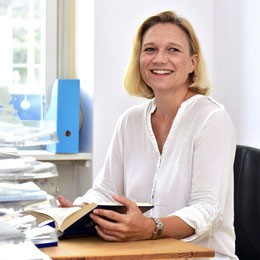Ein Interview mit Ellen Göppl

„Wenn man mir 2000 gesagt hätte, dass ich so lange bleibe, wäre ich wahrscheinlich vom Stuhl gefallen“
Am 15. Januar 2000 nahm Ellen Göppl ihre Arbeit bei Peschel Communications auf. Grund genug, ihr ein paar Fragen zu stellen.
20 Jahre beim gleichen Unternehmen zu arbeiten ist etwas, was immer seltener vorkommt. Hättest Du Dir am 15.1.2000 vorgestellt, dass Du 20 Jahre später noch für das gleiche Unternehmen arbeitest?
Nein, tatsächlich nicht – ich war damals 26 und hatte keinen besonders langen Planungshorizont. Wenn man mir 2000 gesagt hätte, dass ich so lange bleibe, wäre ich wahrscheinlich vom Stuhl gefallen – heute bin ich stolz darauf, weil es ja inzwischen eher ungewöhnlich ist, so lange mit derselben Stelle glücklich zu sein.
Wie hat sich Dein Arbeitsalltag in den letzten 20 Jahren verändert?
Wir haben mit heute 10 festen Mitarbeiter*innen natürlich eine größere Arbeitsteilung als früher. In meinen ersten Jahren habe ich vom Projektmanagement inklusive Angebots- und Rechnungserstellung übers Übersetzen bis zur Revision alles gemacht. Außerdem auch Marketing, Privatkundenbetreuung und sogar Buchführung! Ich bin schon froh, nicht mehr alles machen zu müssen, auch wenn es manchmal ein komisches Gefühl ist, dass ich gar nicht mehr so leicht als Projektmanagerin einspringen kann wie früher – es ist einfach zu spezialisiert inzwischen. Insgesamt sind wir, wie die Übersetzungsbranche im Allgemeinen, im Gegensatz zu vor 20 Jahren deutlich technologisierter.
Wünschst Du Dir manchmal die alten Zeiten zurück?
No, not at all — I was 26 at the time and I didn’t tend to make any long-term plans. If someone had told me back in 2000 that I’d stay here so long, I probably would have fallen off my chair. Today, I’m proud of my decision to stay, because of course it’s become relatively rare for people to be happy with the same job for so long.
How has your typical working day changed in the last 20 years?
We now have 10 in-house employees, which has naturally led to a greater division of labour. In the early years, I did everything from project management, including drawing up quotations and billing, to translation and revision. Not to mention marketing, managing projects for private customers, and even accounting! I’m glad I don’t have to do all of that any more, although it does sometimes feel strange that I can’t jump in to lend a hand in project management so easily these days — it’s just become too specialised. Overall, we rely on technology a lot more than we did 20 years ago, just like the rest of the translation industry.
Do you ever wish you could go back to the way things were?
I wouldn’t have wanted to miss out on the early days, that’s for sure. Back then we shared an office with a small publishing company. Anja and I sat right opposite one another in such close quarters that we sometimes got our mugs of tea mixed up. And we translated by just overwriting the original text in Word. And we had the time to get together for a mid-morning breakfast every day. But I wouldn’t want to give up the team we’ve built since then. For instance, I used to sometimes end up completely alone in the office while the others were on holiday and now I don’t have to worry about that any more. And I wouldn’t want to work without the new tools we have, either. They make terminology work and consistency in particular so much easier.
What’s the best compliment you can remember getting from a client?
One client was so impressed by my translation of a text to do with clinical studies that he asked if I’d studied medicine. I’ve also received plenty of effusive compliments for my work interpreting weddings — although I’m sure it’s partly down to the euphoric mood!
Would you ever want to work somewhere completely different, for example for a multinational corporation?
I do think it would be exciting to work for a big multinational — collaborating with people from all over the world, maybe even travelling abroad for business. But then again, I’m so used to our relatively small company where everything is close at hand, where I have a say in how things work and a lot of flexibility, that I’d rather not switch.
What’s your favourite kind of text to translate?
I especially like working on publicity material for cosmetics, where I more or less have free rein to be as creative as I want. Of course, it depends on finding the right client, one who trusts in my style (and yes, we have one!). And then it makes a nice change when I get a medical text where I have to be really precise.
What three careers could you imagine for yourself if you weren’t a translator?
Apart from pharmacist or biochemist, I could definitely see myself as a writer, which is currently one of my hobbies. Another job that I think would be exciting is computer hacking. Lots of people associate that with crime, but hackers also help thoroughly above-board companies and authorities to track down weak spots in their IT systems and improve data security.
Which language would you still like to learn?
Among others, Romansh. I heard it a lot in Switzerland as a child and learnt to parrot bits and pieces. I’d love to study it more systematically, but I’ve never had the time. Keeping three foreign languages up to scratch is plenty of work already! Maybe I need to spend an immersion holiday in a remote mountain village in the Engadine.
What future moment in your career are you particularly looking forward to?
I’m currently looking forward to the day when we receive ISO 9001 certification, which should hopefully be this year. It’s going to take a lot of preparation, but — just like for large translation projects — striving to meet such high standards is part of the appeal for us.